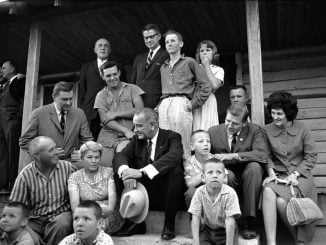
August 13, 1587
Manteo, friend to the Roanoke colonists
On this day, Manteo, an Algonquian Indian, was baptized into the Church of England on Roanoke Island. The baptism was the first in the New World. A friend to colonists from earlier English attempts to settle on Roanoke Island, Manteo also traveled to England in 1584 and again in 1585. He returned to his home with the members of the 1587 colony, who would later become known as the Lost Colony. While in England, Manteo met Sir Walter Raleigh and spent time with the scientist Thomas Harriot, with whom he was already acquainted. He worked with Harriot learning English and teaching Harriot the Algonquian language. Raleigh designated Manteo “Lord of Roanoke,” and it is possible that his baptism was a requirement of receiving that title. His name lives on today as the name of the county seat of Dare County.
August 17, 1816
Death of Samuel Johnston of “Hayes” in Chowan County
Born in Scotland, Samuel Johnston immigrated to North Carolina as an infant. Trained as a lawyer, he represented Chowan County in the colonial assembly until the advent of the American Revolution. During the Revolution, Johnston was a strong leader of the patriot cause. He was a member of North Carolina’s Provincial Council, a delegate to the first four provincial congresses and worked as treasurer to fund and supply the war effort. When North Carolina’s first constitutional convention met in Hillsborough in 1788, Johnston, a leading Federalist, was elected president, even though the majority of delegates were opposed to ratification. He served in the same role in 1789 convention in Fayetteville. A relative of royal governor Gabriel Johnston, Johnston served in the state’s top job from 1787 to 1789, before being elected one of the state’s first U.S. senators in 1789. He retired from public life briefly, before being called on to again serve in the state legislature, this time representing Martin County. His last public position was a superior court judge between 1800 and 1803, and he died less than two weeks after retiring from that post. He is buried at “Hayes,” his Chowan home.
August 18, 1587
Virginia Dare, first English child in the New World
Virginia Dare became the first child born in the Americas to English parents. She was named in honor of the Virgin Queen of England, Elizabeth I. Her parents, Eleanor and Ananias Dare, were part of the Roanoke Colony, an early attempt by the English to establish a permanent settlement in the New World. Her birth was recorded by her grandfather John White, governor of the colony. White returned to England seeking supplies. It took three years before he could secure passage back to Roanoke Island, and upon his return he found the colonists had vanished. On Aug. 18, 1937, the state of North Carolina issued a delayed birth certificate to Virginia Dare, partially to promote the newly established outdoor drama The Lost Colony.
August 19, 1956
Highland Games at Grandfather Mountain date back to 1956
The first Grandfather Mountain Highland Games were held near Linville in 1956. The games were conceived by Agnes MacRae Morton and Donald MacDonald. MacDonald was inspired to start games in North Carolina after attending a similar event on a trip to Scotland. Morton heard of a similar gathering in Connecticut and thought that Grandfather Mountain would be the perfect setting to try something comparable in North Carolina. The pair chose the August 1956 date to commemorate the anniversary of an important event in the 1745 Jacobite Rebellion against in Scotland, though the event was moved to the second weekend in July two years later. The Avery County event has gained international fame, and its competitions in athletics, bagpiping, drumming and dancing are recognized worldwide. The games also have the distinction of being the largest “clan gathering” in the world since it draws so many Scottish family heritage groups. North Carolina had the largest settlement of Highland Scots outside of Scotland until well into 1800s.
Source: North Carolina Department of Cultural and Natural Resources



